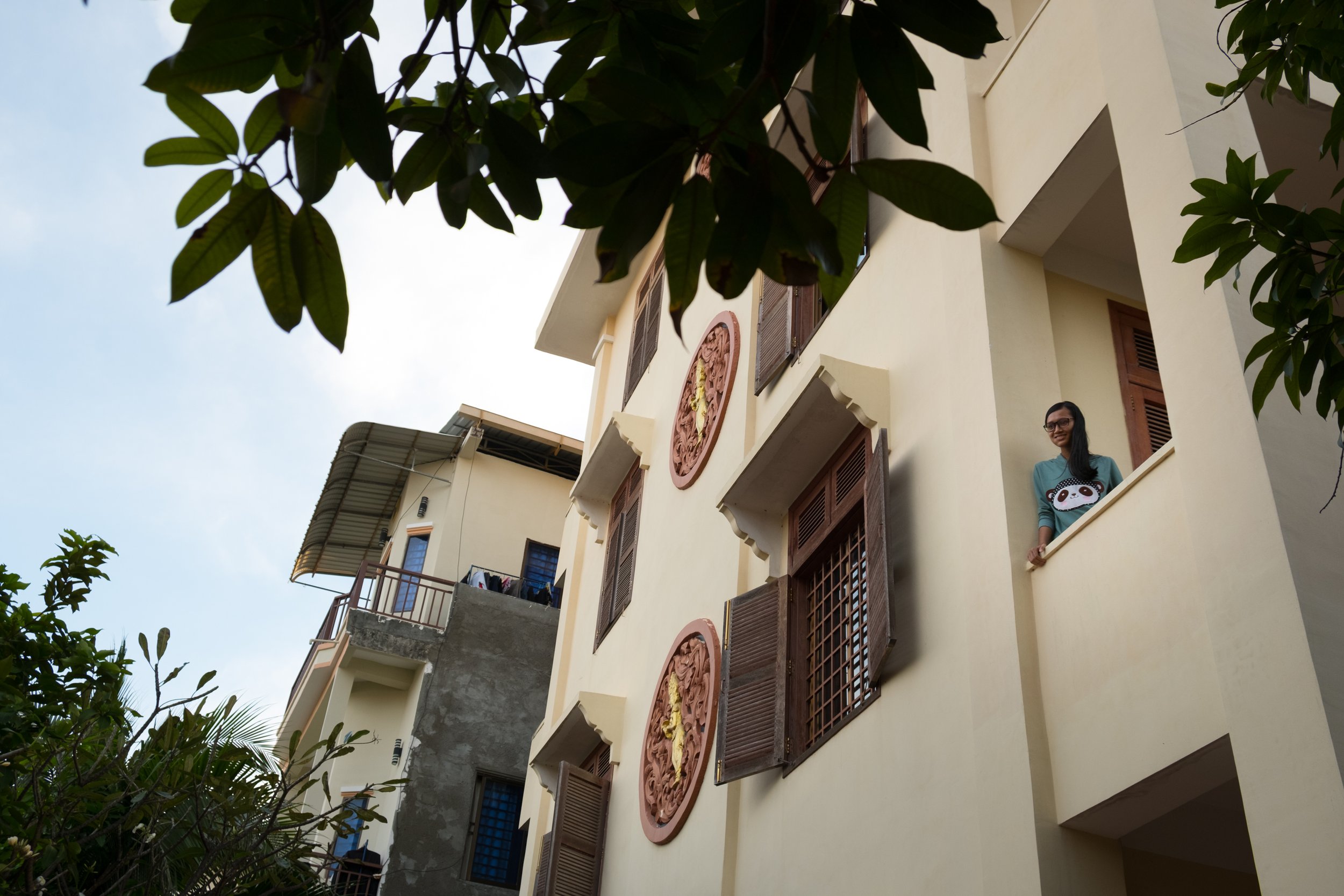About

We Support Women.
Our Mission and Vision
Harpswell advances young women leaders in Southeast Asia with education, training and a supportive network. We envision a new generation of women leaders who create and inspire positive social change.
Our Belief
We believe a community of educated women leaders constitutes the most powerful force for social and economic advances in Southeast Asia and beyond.
I dare to say what I think is right and I’m ready to be a model to other young women who have the courage to fight for their dreams.”
—Harpswell Alumna (Anonymous) in Impact Survey
“Harpswell taught
me to be confident.
Theory of Change
We believe that a community of educated women leaders constitutes the most powerful force for social and economic advances in Southeast Asia and beyond. We focus on the advancement of young women in Southeast Asia.
Core Programs
Harpswell operates two residential leadership centers for young women in Cambodia while they attend university in Phnom Penh, and a two-week leadership training summit in Malaysia for young professional women from the ten ASEAN countries across Southeast Asia and Nepal.
Our goals are to equip participating women leaders by:
Providing a safe space to learn
Developing their leadership and critical thinking skills
Building a lifelong support network
Founding Story
by Alan Lightman
“Would you please help us build a school?”
That was what the women said to me when I arrived at the small village of Tramung Chrum in rural Cambodia. The village had a temporary school, made of bamboo and palm leaves, simply a roof with no walls. In a strong wind, the matchstick construction blew down.
The women, holding their babies as they spoke to me, wanted a real school, made of mortar and brick. It was December 2003, my first trip to Southeast Asia.
-
I had come to this remote village with my twenty-three-year-old daughter Elyse at the encouragement of a Unitarian minister named Fred Lipp.
My daughter and I were overwhelmed by the resilience and hope of these women. Living in one-room huts with no electricity or plumbing, owning only the clothes on their backs and a few plows to tend their farms, still devastated by the destruction of the Khmer Rouge genocide of the 1970s, these women believed in the power of education.
I have learned that some opportunities present themselves only once. I went back to the United States and raised the money for a real school in Tramung Chrum. That was the beginning of Harpswell.
The next year, while hiring a man to build the school in Tramung Chrum, I met a Cambodian woman named Veasna Chea. Veasna’s story changed my life. As for so many Cambodians, her father and brother had been killed by the Khmer Rouge. Despite this tragedy, Veasna excelled in school and was dead set on getting a university education. However, she faced severe obstacles, chief among them the lack of housing for female university students.
Until very recently, universities in Cambodia did not provide dormitories for their students. Most universities are located in Phnom Penh, the capital city, but 80% of the population lives in the countryside. Housing is not difficult for male students, who can live in the Buddhist temples or safely rent rooms together, but those options are not open to female students. So, Veasna and half a dozen other students lived underneath the university building, in the six-foot crawl space between the bottom of the building and the mud. Snakes sometimes visited during the seasonal floods. And this brave group of students lived in that horror of a house for four years.
When I heard Veasna’s story, I realized that she was more courageous than I had ever been. And I was impressed by her belief in the power of education, like the women of Tramung Chrum. Together, Veasna and I came up with the idea of building a dormitory for female students attending university in Phnom Penh. Again, I went back to the US and raised the money. The facility was finished in 2006 and was the first of its kind in Cambodia.
Having the only such facility in the country, we could attract the brightest young university women. And with such a valuable human resource, I decided to give these students more than free room and board. Over the following years, with the help of others, I developed an in-house academic program (which our students take in the weekends and evenings when they are not attending their regular university classes) that includes instruction in critical thinking and leadership skills, English classes, computer training, and more.
In early 2010, we completed our second facility in Cambodia, on the other side of the city. Together, the two dorms house about 80 students. As of early 2022, we have approximately 230 graduates, working as teachers, lawyers, engineers, journalists, doctors, businesswomen, directors of NGOs, and more. These women stay closely connected to each other and to Harpswell, inspiring and supporting each other as they make affirmative choices in their careers and families and lift their communities in the process.
In 2017, Harpswell expanded its work by starting a twelve-day annual program in leadership training and critical thinking for young women from all ten countries of Southeast Asia. That program is based in Penang, Malaysia and now has about 75 graduates. Some have started their own humanitarian projects, based on what they have learned from us. Harpswell’s family continues to grow, and I hope that the passion for education and desire to improve their communities and world continues into future generations.
The Harpswell Name
The name of a town in Maine, “Harpswell,” is rooted in the language of the Abenaki indigenous ethnic group of North America.
The Abenaki referred to the town as a “quick carrying place,” given the clear passageway it afforded weary travelers.
This meaning resonates with us, too, as we seek to provide “a carrying place.”
We provide such a place through safe spaces, education and leadership opportunities and an unparalleled sisterhood. We help clear the path for remarkable young women in Southeast Asia who face oversized obstacles on their path to better futures.













